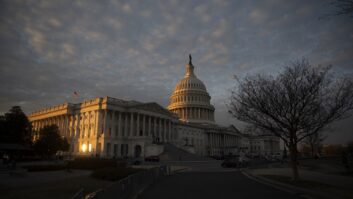As of April 26, the Federal Communications Commission can start hitting pirate radio operators with beefy new fines.
The Federal Register has now published rules that the FCC recently adopted at the direction of Congress in the “Preventing Illegal Radio Abuse Through Enforcement (PIRATE) Act.” The rules take effect April 26.
[Read “It’s Official: PIRATE Act Signed Into Law”]
The act, signed by President Trump early last year, gives the FCC authority to levy fines of up to $100,000 per violation and $2 million in total.
It also aimed to streamline the enforcement process; requires the FCC to conduct mandatory enforcement sweeps in cities with the highest concentration of pirate radio use; and seeks to ensure more coordination among federal, state and local law enforcement.
The law also mandated the creation of a publicly accessible online database that lists U.S. stations as well as all entities that have received notice that they are operating a broadcast station without authority.
But whether the commission will be able to carry out all of these goals anytime soon is a question.
In January, as we’ve reported, the head of enforcement at the FCC told Congress that efforts to implement the act against illegal stations have been hampered by the pandemic as well as a lack of funding.
Rosemary C. Harold, chief of the Enforcement Bureau, submitted the commission’s first annual report to Congress about its pirate radio work.
Harold said the mandatory telework policy that took effect due to COVID-19 was an obstacle. And, she continued, as of January the commission had received no funding to implement the act a year after it became law.
“The Congressional Budget Office and the commission both estimated that it would cost $11 million for the commission to implement the act,” she said then.
“And yet, the PIRATE Act itself contained no appropriation or other funding source to cover its implementation costs. And because the commission’s FY 2021 budget ceiling level was established by the Office of Management and Budget on December 3, 2019, before Congress adopted the PIRATE Act, the commission did not have an opportunity to incorporate costs related to the implementation of the PIRATE Act during the president’s fiscal year (FY) 2021 budget process.”
As to “sweeps” that the FCC is supposed to do at least once a year in the five markets where pirate radio is worst, she said the commission began studying this but the bureau’s ability to conduct the sweeps “will remain subject to obtaining new funding through the appropriations process” as well as the end of the pandemic. For the same reasons, the public database doesn’t exist a year after it was supposed to be in place.
By the way, the federal government in these new rules defines pirate radio broadcasting as “the transmission of communications on spectrum frequencies between 535 and 1705 kilohertz, inclusive, or 87.7 and 108 megahertz, inclusive, without a license issued by the commission, but does not include unlicensed operations in compliance with part 15 of title 47, Code of Federal Regulations.” Part 15 allows certain unlicensed operations at very low power levels.







